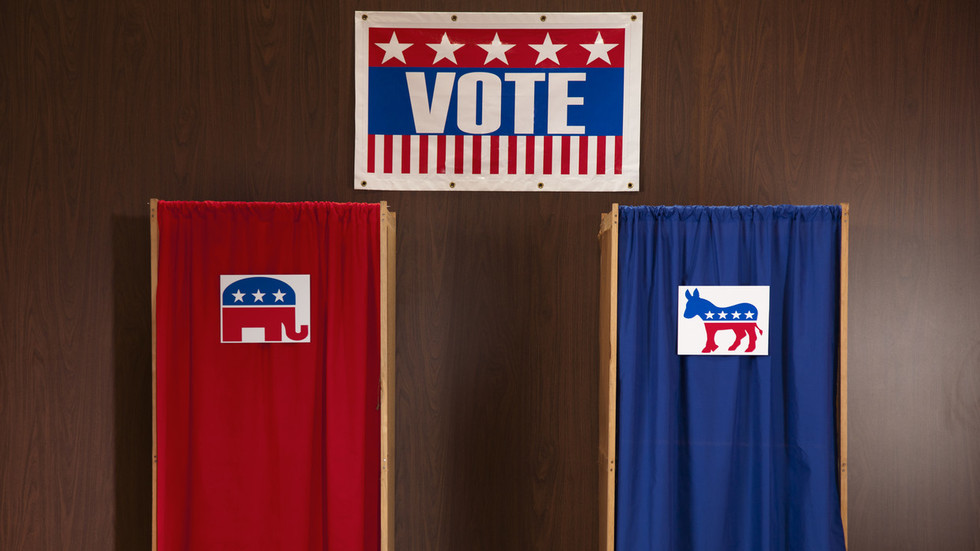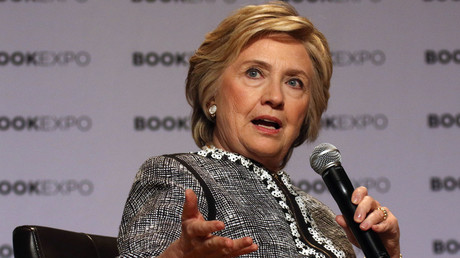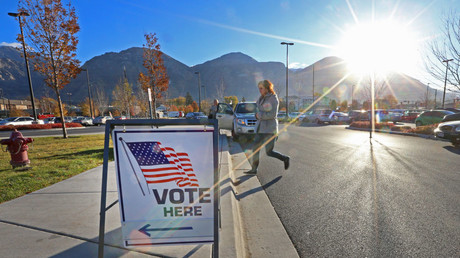If America is a consumer paradise, why are Republicans & Democrats the only choices available?
Robert Bridge is an American writer and journalist. Former Editor-in-Chief of The Moscow News, he is author of the book, 'Midnight in the American Empire,' released in 2013.

Americans enjoy the excesses of consumerism to the point of overabundance and redundancy. Yet come election time, the only choice to be found on the threadbare shelves year after year is Republican and Democrat.
Enter any grocery store in the United States and you will likely suffer culture shock at the mind-numbing variety of consumer choice. A shopper could spend hours hunting and gathering down long aisles of cold breakfast cereals, snack foods, fizzy drinks and hundreds of other assorted waist-busters that American consumers can't imagine doing without. But is this superfluity in the supermarkets just compensation for something that is conspicuously missing from the political scene?
If the US political system were imagined as a supermarket, the cornucopia of variety would come to a screeching halt. Instead, shoppers would be greeted with row after row of Republican and Democratic labels all screaming out for your attention – high-sodium stuff for long shelf life, like Mitt Romney canned corn and Hillary Clinton spaghetti sauce. Meanwhile, back at the ranch, all of the commercials on television would be spotlighting the Republican and Democratic brand as if nothing else existed in the world.
The fact is other 'political products' are available in the United States, but they are buried deep and dusty on the store shelves, and non-existent on television. There is the Libertarian Party and Green Party, for example, and even a Communist Party. But like anything, if alternative choices are not advertised and discussed on the evening news they might as well as not exist. 'Out of sight, out of mind,' as the pithy saying goes.
Some people might argue that US consumers simply prefer the Republican and Democratic brand – just as they show fierce loyalty to either Pepsi or Coca Cola – and that is why these two parties have conquered America's heart and soul. That would be greatly simplifying matters. In a 2016 poll, it was shown that 47 percent of Americans say they would consider voting for a third party candidate. That number is up from 38 percent in 2008 and 40 percent in 2012.
Meanwhile, many Americans are not aware of the dirty little secret regarding the US political system, which is that the Republicans and Democrats essentially own it. And that is not just figuratively speaking.
In 1987, a strange thing happened on the way to the White House. The Republicans and Democrats pulled off a mini coup d'etat of sorts when they had the audacity to make demands on the commission that was responsible for managing the presidential debates. Since 1976, that function had been faithfully performed by the League of Women Voters.
What really annoyed the Republicans and Democrats was that the League had permitted third-party candidates to participate in the presidential debates.
In a news release from October 3, 1988 League President Nancy M. Neuman said the League was "withdrawing its sponsorship of the presidential debate…because the demands of the two campaign organizations would perpetrate a fraud on the American voter."
The Republicans and Democrats then pulled out their devilish plans for a private nonprofit corporation called the Commission on Presidential Debates (CPD), which receives its funding from various corporations. Since then they've enjoyed monopolistic control over the political process as they've de facto excluded third party contenders from participation.
In 2000, the CPD – which has also, incidentally, lent its technical expertise to Ukraine, among other struggling 'democracies' – laid down a rule that for a candidate to be included in the debates he or she must attract at least 15% of support across five national polls. However, since these polls are organized by the corporate-owned mainstream media – no impartial observers of the US political process, to be sure – only the independent candidate Ross Perot, a billionaire businessman, was able to break through the threshold in the 1992 campaign against George H.W. Bush and Bill Clinton.
Follow the money
Just like a corporation that covets monopolistic control of the market, so do the Republicans and Democrats want full control of the political market. The reason is not just a matter of power, but money. Boatloads of it. In November, for example, the midterm elections smashed the record for the amount of campaign donations collected, surpassing $5 billion dollars. This is a pie that the two dominant parties have no intention of sharing with any third party.
At the same time, powerful corporations and individuals expect to get something in return for their contributions, otherwise why would they crack open their wallets?
"Corporations don't give their money away for nothing," wrote Warwick Smith, a researcher at Per Capita, in the Guardian. "There is an understanding (rarely made explicit) that large campaign donations buy political access and favorable consideration in policy development and legislation."
That may just be the nicest definition of outright bribery I have ever read. In any case, where does this special relationship between the special interest groups and politicians leave the average voter, who is no position to match such massive funding?
"Politicians will only act on behalf of voters if no wealthy or powerful group objects…," Smith continued. Or in the event of "strong community action."
Clearly, this was not the way democratic process was supposed to work.
But the story gets more disturbing. Not only are the Republicans and Democrats cashing in on a monopolistic system of government where they receive massive amount of corporate contributions for which they are expected to return in the form of political favors once in office. These politicians are also becoming high-paid lobbyists themselves after they leave public service, a widespread practice that is known as 'revolving-door politics.'
As just one example, consider former Vice President Dick Cheney. In 1992, he hired Brown & Root Services (BRS) to produce a classified report detailing how private companies could help provide logistics for US troops in military hot spots around the world. That same year, according to Mother Jones, BRS secured a five-year logistics contract from the US Army Corps of Engineers to "work alongside American GIs in places like Zaire, Haiti, Somalia, Kosovo, the Balkans, and Saudi Arabia."
Fast forward to 1995 and Cheney was the CEO of Halliburton Company, the oil services giant, which just happens to own BRS.
"Since then, Cheney has collected more than $10 million in salary and stock payments from the company," MJ continued. "In addition, he is currently the company's largest individual shareholder, holding stock and options worth another $40 million."
This incestuous mess in the US political system, where it's almost impossible to differentiate between the lobbyists and the money-grabbing politicians, brings to mind a remark that former Minnesota governor Jesse Ventura repeated to me while visiting Moscow.
"I think that all American politicians today should be required to wear those NASCAR jumpsuits that display corporate sponsors," Ventura told me. "So we can know where their true interests lie."
That seems to sum up America's dilemma with where to draw the line on corporate money in the political system. It has prevented any third-party political alternative from arising, while denying the voters true representation. Such a defunct system of democracy that forever marginalizes the voter in favor of corporate power cannot be expected to last forever.
Like this story? Share it with a friend!
The statements, views and opinions expressed in this column are solely those of the author and do not necessarily represent those of RT.



0 Comments:
Post a Comment
Subscribe to Post Comments [Atom]
<< Home